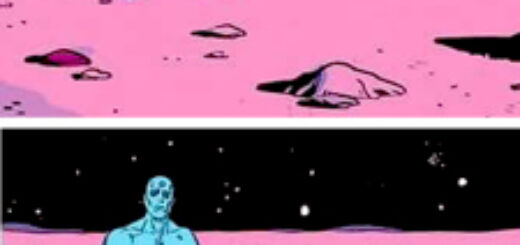Joe Corallo: That Joke’s Not Funny Anymore
For all you mainstream comic fans, last week was a doozy. If you’re in that tiny minority of people that somehow avoided all the craziness last week, haven’t read the new Captain America or DC Rebirth but still plan on it, maybe it’d be best if you did before you read on. I’m totally going to spoil things.
Now that we’re all caught up let’s start with the less controversial DC Rebirth #1. Other than my own personal issues with it being far too heavy on the exposition through narrative (come on people, it’s a visual medium!) the most striking thing to myself and seemingly many others was the introduction of Dr. Manhattan of Watchmen fame into the main DC continuity.
Watchmen has been an odd property at DC ever since it premiered, never quite being in the DCU but also not being allocated to one of DC’s smaller imprints. Damn near very comics fan is at least somewhat familiar with Alan Moore’s falling out with DC Comics. People higher up in DC like Paul Levitz did try to respect Alan Moore’s wishes in so far as pushing back against others within the company from trying to use the property in other projects. However, after Paul was no longer corporate president, plans were quickly put in motion to capitalize on Watchmen’s success with Before Watchmen.
Before Watchmen was met with mixed reviews and comparatively disappointing sales. So after Before Watchmen flopped, why would DC want to try to incorporate Dr. Manhattan into the main DCU? Did they feel like they haven’t annoyed Alan Moore enough recently? Incorporating Watchmen into Rebirth seems like it’s not only a bad idea, but a bad idea with a recent proven track record of being a bad idea.
We’ll get back to that in a bit. Now onto the more controversial comic from last week, Captain America: Steve Rogers #1. In case you did not heed my earlier warning and are reading this without having heard what happened, live firmly under a rock with no Internet access and someone was kind enough to print this column out for you, Captain America has come out as a Hydra agent. You know, that Hydra. The bad one. The one that has caused the Internet to argue over exactly what degree of Nazi that Hydra is.
Newsflash: if you’re arguing about how Nazi a thing is, said thing in question is probably already too Nazi.
I’m not going to get into too many of the details here as it’s been explained and editorialized into oblivion since last week. I do fall onto the side of the argument that goes: maybe don’t do this to a beloved movie franchise character that children look up to. And I will add that some people I’ve seen compared this to Superior Spider-Man, and while I under that it’s tempting to compare the two the reality of this fiction is that we all knew Superior Spider-Man was Doc Ock from day one.
Although both of these events last Wednesday seem radically different from one another, they are really both different parts of the same problem. The mainstream comic book industry, Marvel and DC, are uniquely trapped by their intellectual property and this problem has not and is not being addressed properly. I’d argue that reboots are absolutely necessarily for these companies. The problem is that they keep trying to reboot the characters and stories, but what really needs to be rebooted is the corporate culture.
We live in as world where if you create new characters for Marvel or DC you have no ownership of them. They could be a huge hit and a cash grab for a generation or more, but you won’t see much money from it, if any. Hell, our own Denny O’Neil wrote the Iron Man story that was borrowed heavily from to create the movie that launched Marvel Studios and saved the company. Try to find a producer credit for him.
No one expects every idea to take off and be a mega hit. And comics is a very collaborative medium where it can become difficult to figure out exactly who gets the credit, especially in the years before this was taken more seriously. However, a creator is not going to be nearly as motivated to use the best ideas, create the best characters, and give Marvel or DC the chance of getting big crossover hit. They can just take those ideas to Image or another creator-owned publisher.
You see it all the time now. Indie creators getting some buzz, Marvel or DC scooping them up and helping build the creator’s fan base, then said creator takes a chunk of those fans with them when they decide they’ve gotten enough out of Marvel or DC and focus on their creator-owned ideas. Just look at Rick Remender, Alex Kot, Matt Fraction. Kelly Sue DeConnick, and Ed Brubaker. That’s just off the top of my head.
I get that it’s not an easily solved situation for Marvel and DC. I understand how these are complicated problems that involved multiple departments and corporate entities. However, the way both companies are handling their properties right now with the constant reboots, reshuffling, shooting for short term profits and ignoring (at least publicly) long term solutions, the only reboot they really need to concern themselves with is in their legal departments.












